

Mohamed M. continues to incite hatred. A few weeks after his release from prison, Austrian Islamist Mohamed M. is highly active again. He regularly appears in mosques, rails against the West and glorifies terrorism. Mohamed M. at a Vienna mosque The location of the event is bizarre: The Dar us-Salam mosque, a meeting place for Austrian Islamists on Vienna’s “Gürtel” ring road, is sandwiched between a strip club and a catholic church. But that does not discourage young radical Muslims from coming regularly to the religious location situated in the basement of a 19th century building in Vienna’s 8th district. The reason for the inrush of young Islamists are the lectures by Mohammed M. . “There are people who say: Terrorism has nothing to do with Islam,” Mohamed whispers to the audience. Mohamed agitates against the West, against infidels and especially against moderate Muslims, who in his opinion, abandon the Islamic Ummah. Under observation Mohammed’s messages are being disseminated through multiple channels on the Internet.
Abu Hamza al-Masri. In this Arabic name, the name "al-Masri" is a laqab, not a family name, and that the person should be referred to by the given names "Abu Hamza" or "Hamza" (but never "Abu").
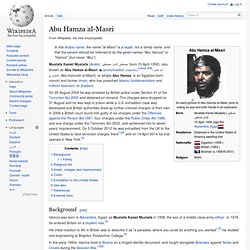
Mustafa Kamel Mustafa (Arabic: مصطفى كامل مصطفى; born 15 April 1958), also known as Abu Hamza al-Masri ( pronunciation ;[needs IPA] أبو حمزة المصري, Abū Ḥamzah al-Maṣrī), or simply Abu Hamza, is an Egyptian-born convict and former imam, who has preached Islamic fundamentalism and militant Islamism, or jihadism.
On 26 August 2004 he was arrested by British police under Section 41 of the Terrorism Act 2000 and detained on remand. The charges were dropped on 31 August and he was kept in prison while a U.S. extradition case was developed and British authorities drew up further criminal charges of their own. Movsar Barayev. Movsar Buharovich Barayev (Russian: Мовсар Бухарович Бараев) (October 26, 1979 - October 26, 2002), earlier known as Suleimanov, was a Chechen militia leader during the Second Chechen War, who led the seizure of a Moscow theater that led to the deaths of over 170 people.
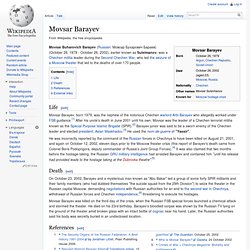
Life[edit] He was incorrectly reported by the command of the Russian forces in Chechnya to have been killed on August 21, 2001, and again on October 12, 2002, eleven days prior to the Moscow theater crisis (this report of Barayev's death came from Colonel Boris Podoprigora, deputy commander of Russia's Joint Group Forces).[4] It was also claimed that two months before the hostage-taking, the Russian GRU military intelligence had arrested Barayev and contained him "until his release had provided leads to the hostage taking at the Dubrovka theatre".[5]
Abu Doha. Amar Makhlulif alias Abu Doha (Arabic: ابو ضحى) is an Algerian alleged to be member of the al-Qaeda and GSPC terrorist networks.

He was arrested at London Heathrow Airport in February 2001 while attempting to travel to Jeddah, Saudi Arabia on a forged passport.[1][2] On 3 July 2008 the British bench released him from prison, under several security measures including a 22-hour-per-day curfew. Although the British press was forced to identified him only as "U", the other data about "U" identifies him clearly as Abu Doha.[3] Dokka Umarov. During the late 1990s, after Chechnya's first war against Russia, Udugov's status of war hero enabled him to take the post of the breakaway republic's security minister.
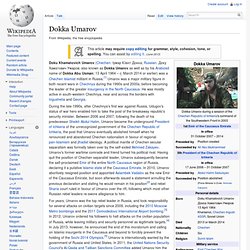
Between 2006 and 2007, following the death of his predecessor Sheikh Abdul Halim, Umarov became the underground President of Ichkeria of the unrecognized government of the Chechen Republic of Ichkeria, the post that Umarov eventually abolished himself when he renounced and abandoned Chechen nationalism in favour of regional pan-Islamism and jihadist ideology. A political mantle of Chechen secular separatism was formally taken over by the self-exiled Akhmed Zakayev, Umarov's former wartime comrade and friend turned his political rival. Having quit the position of Chechen separatist leader, Umarov subsequently became the self-proclaimed Emir of the entire North Caucasus region of Russia, declaring it a putative Islamic state of the Caucasus Emirate. Muqtada al-Sadr. Muqtadā al-Ṣadr (Arabic: سيد مقتدى الصدر) (born 12 August 1973)[1] is an Iraqi Islamic political leader.
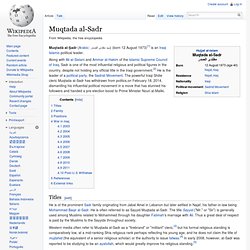
Along with Ali al-Sistani and Ammar al-Hakim of the Islamic Supreme Council of Iraq, Sadr is one of the most influential religious and political figures in the country, despite not holding any official title in the Iraqi government.[2] He is the leader of a political party, the Sadrist Movement. The powerful Iraqi Shiite cleric Muqtada al-Sadr has withdrawn from politics,on February 18, 2014, dismantling his influential political movement in a move that has stunned his followers and handed a pre-election boost to Prime Minister Nouri al-Maliki. Hassan Nasrallah. Hasan Nasrallah (born 31 August 1960; Arabic: حسن نصرالله) became the third Secretary General of the Lebanese political and paramilitary organization Hezbollah after Israel assassinated the previous leader, Abbas al-Musawi, in 1992.[1] He is often referred to as 'al-Sayyid Hassan' (السيّد حسن), where the honorific title Sayyid denotes his being a descendent of the Islamic prophet Muhammad, through his grandson Husain ibn Ali.
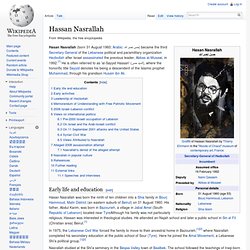
Early life and education[edit] Khaled Mashal. Khaled Mashal, (Arabic: خالد مشعل Khālid Mashʿal, Levantine Arabic: [xaːled meʃʕal], born 28 May 1956) is a Palestinian political leader and the leader of the Hamas political bureau since the Israeli assassination of Abdel Aziz al-Rantissi in 2004.[1] After the founding of Hamas in 1987, Mashal came to lead the Kuwaiti branch of the organization.[1] He moved from Kuwait to Jordan in 1991.
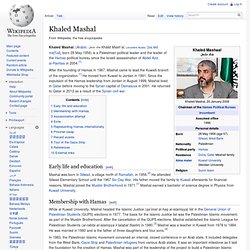
Since the expulsion of the Hamas leadership from Jordan in August 1999, Mashal lived in Qatar before moving to the Syrian capital of Damascus in 2001. He returned to Qatar in 2012 as a result of the Syrian civil war. Abu Musab al-Zarqawi. Abu Musab al-Zarqawi (Arabic: أبومصعب الزرقاوي, pronunction ’Abū Muṣ‘ab az-Zarqāwī, Abu Musab from Zarqa); October 30, 1966 – June 7, 2006), born Ahmad Fadeel al-Nazal al-Khalayleh (Arabic: أحمد فضيل النزال الخلايله, ’Aḥmad Faḍīl an-Nazāl al-Ḫalāyla) was a militant Islamist from Jordan who ran a paramilitary training camp in Afghanistan.
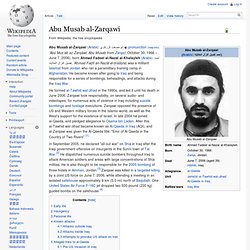
He became known after going to Iraq and being responsible for a series of bombings, beheadings, and attacks during the Iraq War. Abu Sabaya. Abu Sabaya ( pronunction AH-boo sah-bah-YAH[needs IPA] July 18, 1962 [1] – June 21, 2002), born Aldam Tilao, was one of the leaders of the Abu Sayyaf in the southern Philippines until he was killed by soldiers of the Philippine Army in 2002.
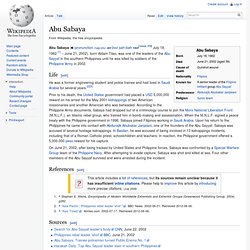
Life[edit] He was a former engineering student and police trainee and had lived in Saudi Arabia for several years.[2][3] Prior to his death, the United States government had placed a USD 5,000,000 reward on his arrest for the May 2001 kidnappings of two American missionaries and another American who was beheaded. According to the Philippine Army documents, Sabaya had dropped out of a criminology course to join the Moro National Liberation Front (M.N.L.F.), an Islamic rebel group, who trained him in bomb-making and assassination. On June 21, 2002, after being tracked by United States and Philippine forces, Sabaya was confronted by a Special Warfare Group team of the Philippine Navy.
Osama bin Laden. Osama bin Mohammed bin Awad bin Laden (/oʊˈsɑːmə bɪn moʊˈhɑːmɨd bɪn əˈwɑːd bɪn ˈlɑːdən/; Arabic: أسامة بن محمد بن عوض بن لادن, Usāmah bin Muḥammad bin ‘Awaḍ bin Lādin; 10 March 1957 – 2 May 2011) was the founder of al-Qaeda, the Sunni militant Islamist organization that claimed responsibility for the September 11 attacks on the United States, along with numerous other mass-casualty attacks against civilian and military targets.[2][3][4] He was a Saudi Arabian, a member of the wealthy bin Laden family, and an ethnic Yemeni Kindite.[5] He was born in the bin Laden family to billionaire Mohammed bin Awad bin Laden in Saudi Arabia.
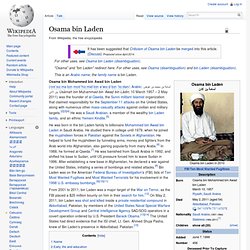
He studied there in college until 1979, when he joined the mujahideen forces in Pakistan against the Soviets in Afghanistan. Name There is no universally accepted standard for transliterating Arabic words and Arabic names into English;[16] however, bin Laden's name is most frequently rendered "Osama bin Laden". Early life and education Personal life. Ayman al-Zawahiri. Ayman Mohammed Rabie al-Zawahiri[2] (Arabic: أيمن محمد ربيع الظواهري ʾAyman Muḥammad Rabīʿ aẓ-Ẓawāhirī, born June 19, 1951) is an Egyptian physician,[3] Islamic theologian and current leader of the militant Islamist organization al-Qaeda.[4] Ayman al-Zawahiri is a former member of Islamist organizations which have both orchestrated and carried out multiple attacks on the continents of North America, Asia, Africa and the Middle East.
In 2012 he called on fellow Muslims to kidnap western tourists in Muslim countries.[5] Since the September 11 attacks, U.S. State Department has offered a US$25 million reward for information leading to al-Zawahiri's apprehension.[6] He is under worldwide sanctions by the United Nations Security Council 1267 Committee as a member or affiliate of al-Qaeda.[7] Alternate names and sobriquets. Shamil Basayev. Ibn Al-Khattab. Thamir Saleh Abdullah Al-Suwailem (Arabic: ثامر صالح عبد الله السويلم) (April 14, 1969 – March 20, 2002), more commonly known as Emir Khattab (also transliterated as Amir Khattab and Ameer Khattab) meaning Commander Khattab, or Leader Khattab, and also known as Habib Abdul Rahman, was working with Chechen Mujahideen in the First Chechen War and the Second Chechen War.
The origins and real identity of Khattab remained a mystery to most until after his death, when his brother gave an interview to the press.[1] He died on 20 March 2002 following exposure to a poison letter delivered via a courier that had been recruited by Russia's FSB. Pierre Vogel. Fritz Gelowicz. The 2007 bomb plot in Germany (German: Sauerland-Gruppe, "Sauerland Group") was discovered following an extensive nine-month investigation, involving some 300 people,[1] three men were arrested on 4 September 2007 while leaving a rented cottage[2] in the Oberschledorn district of Medebach, Germany where they were alleged to have stored 700 kg (1,500 lb) of a hydrogen peroxide-based mixture and 26 military-grade detonators[3][4] and were attempting to build car bombs.[5] Perpetrators[edit] The three suspects were all unemployed.[6] Two were German converts to Islam from Christianity,[7] who had attended Pakistani camps run by Islamic Jihad Union.[8]
Reda Seyam. Reda Seyam ist ein deutscher Islamist ägyptischer Abstammung, der verdächtigt wird, zu den Hintermännern des Sprengstoffattentats in Bali zu gehören. Ibrahim Abou-Nagie. Mohamed Mahmoud. Mohamed Mahmoud (* 18. Juni 1985 in Wien) ist ein österreichischer Islamist und verurteilter Terrorist. Er gilt als Anführer der am 14.